MENU
CH | CHF
CH | CHF
-
- Benchtop Centrifuges
- Floor-Standing Centrifuges
- Refrigerated Centrifuges
- Microcentrifuges
- Multipurpose Centrifuges
- High-Speed Centrifuges
- Ultracentrifuges
- Concentrator
- High-Speed and Ultracentrifugation Consumables
- Accessories
- Tubes
- Plates
- Device Management Software
- Sample and Information Management
- IVD Products
No results found
Search Suggestions
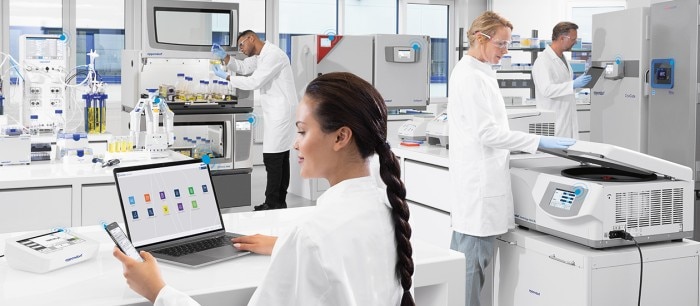
Measuring Laboratory Efficiency Following Digitalization
Lab Academy
- Digital Lab Solutions
- Essay
How does digitalization impact lab productivity? In this blog, we take a look at how to measure lab efficiency.
Digitalization is transforming many aspects of the modern laboratory. From data capture and connectivity to analytics and automation, digitalization is having an increasing impact on processes throughout research and development workflows. Driven by a demand for more streamlined and innovative systems, emerging technologies such as smart software and digital informatics for lab management have become increasingly popular. And as their use increases throughout laboratories, we usher in a departure from long-held, time-consuming manual practices.
There is a varied range of digital technologies that stand to make the laboratory more efficient. Examples of these include:
While the benefits of adopting such technologies into the laboratory space can be far-reaching, it can sometimes be challenging to quantify in real terms how much digitalization has impacted lab efficiency and productivity. In light of the reluctance of some to digitalize lab systems, it is important to attain an accurate measure of lab efficiency/productivity if you want to build a strong business case for digitalization. Although the initial prospect of measuring lab efficiency following digitalization can seem daunting, there are a few key metrics of performance and value that can provide a robust indication of efficiency and productivity. By keeping track of some key performance indicators, it can be made easier to grasp a true measure of the benefits of digitalization. In this blog, we will take a closer look at some at some of these metrics, and identify some key areas where lab efficiency is best measured.
There is a varied range of digital technologies that stand to make the laboratory more efficient. Examples of these include:
- Electronic lab notebooks (ELNs) – designed to replicate your paper lab book with protocols, observations, notes, and other data
- Lab monitoring software – remotely monitor temperature, humidity, and CO2 and O2 levels in your CO2 incubators
- Sample management systems - manage, track and retrieve samples
While the benefits of adopting such technologies into the laboratory space can be far-reaching, it can sometimes be challenging to quantify in real terms how much digitalization has impacted lab efficiency and productivity. In light of the reluctance of some to digitalize lab systems, it is important to attain an accurate measure of lab efficiency/productivity if you want to build a strong business case for digitalization. Although the initial prospect of measuring lab efficiency following digitalization can seem daunting, there are a few key metrics of performance and value that can provide a robust indication of efficiency and productivity. By keeping track of some key performance indicators, it can be made easier to grasp a true measure of the benefits of digitalization. In this blog, we will take a closer look at some at some of these metrics, and identify some key areas where lab efficiency is best measured.
Read more
Read less
- Digitalization, digitization, and digital transformation – what’s the difference?
Read more
Read less
Digitization
The process of creating a digital representation of physical objects. For example, scanning a paper document and converting to a digital document such as PDF.
Digitalization
A holistic approach to digitization that enables and improves processes by leveraging digital technologies and digitized data.
Digital Transformation
A complete business transformation enabled by digitalization technologies. For example, a shift from local monitoring of lab systems to remote monitoring.
The process of creating a digital representation of physical objects. For example, scanning a paper document and converting to a digital document such as PDF.
Digitalization
A holistic approach to digitization that enables and improves processes by leveraging digital technologies and digitized data.
Digital Transformation
A complete business transformation enabled by digitalization technologies. For example, a shift from local monitoring of lab systems to remote monitoring.
Read more
Read less
What are the bottlenecks with traditional lab management techniques?
When seeking to quantify the effects of digitalization upon laboratory efficiency, it can be constructive to begin by considering the problems presented by traditional practices and lab management systems as a comparator. Let’s take a look at some of the common inefficiencies that occur with traditional lab management approaches:
Data management
Data management is a major component of any lab operation and a common area where inefficiencies can arise. Approached traditionally, it is often necessary to manually record complex data sets into non-centralized systems, and as such, low-value data input tasks can take up a significant amount of a lab worker’s time. When data must be manually input in a repetitive fashion, it increases the likelihood of error being introduced into the recorded dataset and so manual data input can also be a hindrance to producing reliable and consistent data.
Data storage
Consider next where your experimental data is stored. Traditionally, datasets may have been compiled within various disparate data management platforms and systems, rendering the task of pooling and standardizing data for a given research project time consuming and laborious. A lack of connectivity can cause a host of inefficiencies and brings a great deal of unnecessary administrative work when retrieving data for analysis.
Sample management
Sample management presents many opportunities for inefficiencies to arise. Traditional handwritten labels are prone to detaching, leading to samples being muddled or misidentified. Inadequate fridge/freezer storage systems can lead to improper use of storage space and lead to time wasted when retrieving samples for analysis.
Paper-based systems
Traditional lab management brings with it an overreliance on paper that can affect day-to-day operations at every level. While paper-based sample and data management systems are problematic from an environmental point of view, it also impedes the ability to edit, share, and retrieve information. Providing somewhere to store the vast amount of paperwork required also takes up considerable space and can come at a cost.
Approached traditionally, all of these operations require significant manual effort and can consume a considerable amount of time. Identifying process flaws such as these is a key first step when seeking to calculate the benefits of a digital solution.
Interested in going paperless? Check out our recent blog post for more information.
Read more
Read less
Determining key performance indicators to quantify the value of digitalization
We have seen how traditional lab management approaches can hinder laboratory efficiency and productivity, but how can we translate these into measurable metrics that could be improved upon with digitalization?
Successful quantification of the effects of digitalization relies upon the selection of key performance indicators. First, it is helpful to determine which metrics are important for the performance of your laboratory. These can be identified by looking at current areas of inefficiency and how these might be measured.
Implementing a survey-based valuation approach is a simple yet effective way of gaining data on your key performance metrics before and after implementing a digital solution. Set out below are some of the example metrics mentioned above and an idea for how a survey-based scoring system might work.
If you are considering implementing digitalization to improve your lab efficiency, the ability to define, record and track data in this way can be critical to identify process flaws and areas for improvement. If you are yet to adopt digitization, it can be useful to extrapolate key metrics such as these to build a case for digitalization.
Read more
Read less
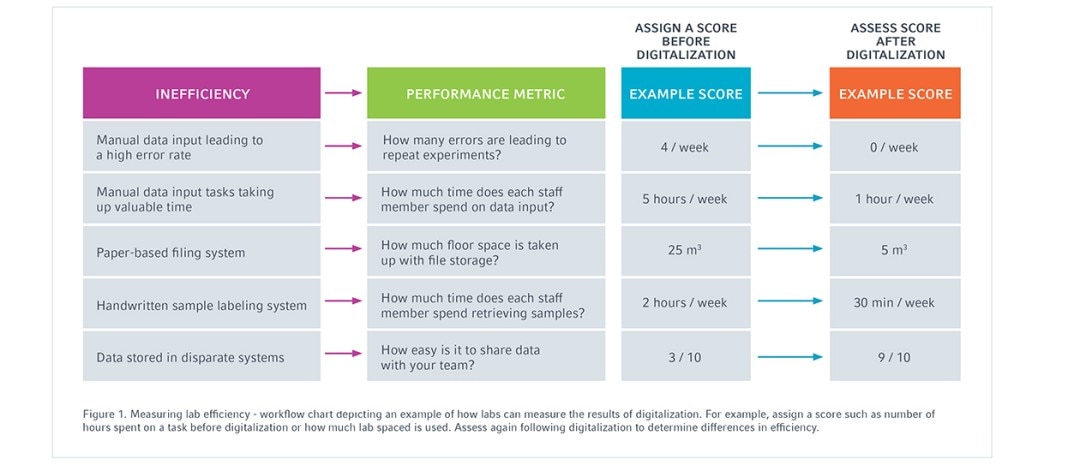
Measuring lab efficiency – workflow chart depicting an example of how labs can measure the results of digitalization. For example, assign a score such as number of hours spent on a task before digitalization or how much lab spaced is used. Assess again following digitalization to determine differences in efficiency.
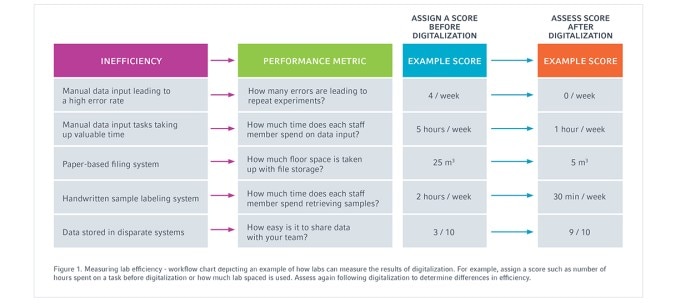
Time to digitalize your lab?
We have covered many of the common inefficiencies faced in the lab and methods towards quantifying the benefits of implementing digital solutions. But what digitalization solutions are available and how do they stand to improve efficiency and productivity in the lab?
At Eppendorf, we offer a range of digital lab solutions such as the innovative eLabNext software range and VisioNize® Lab Suite, for the ultimate in sample and lab information management. These can aid every aspect of day-to-day lab operations and options include:
- eLabInventory ® - the smart sample management software that combines sample inventory, management and tracking to enable the rapid location and retrieval of samples, wherever they may be stored. Make handwritten labelling a thing of the past with barcode automation and keep your data secure with user roles and permissions.
Read more
Read less
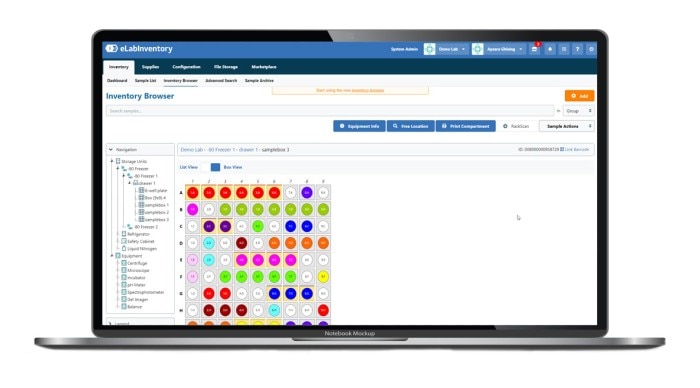
- eLabJournal ® - the innovative electronic lab notebook, eLabJournal, is a centralized platform in which you can document and store all of your study protocols, data and files. This software can enable scientists to record data directly in one platform, eliminating time wasted and human error from manual data logging.
Read more
Read less
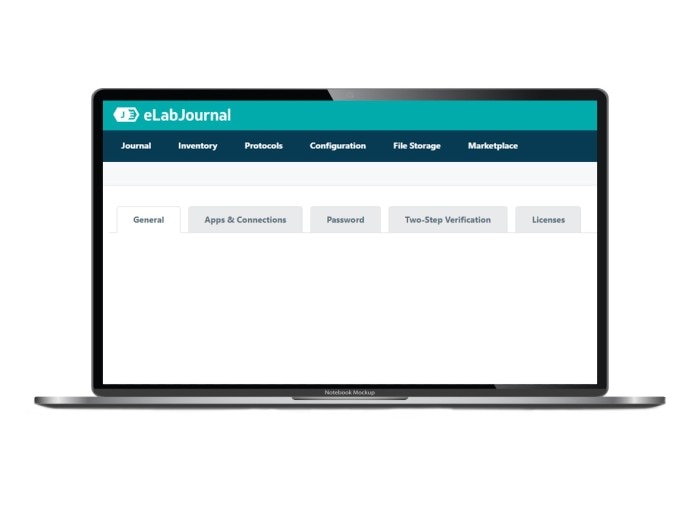
- VisioNize® Lab Suite - Improve connectivity in your lab. With VisioNize Lab Suite, you can keep track of all of your lab instrumentation with our smart platform for maintenance management. Reduce the downtime of your lab equipment with real time monitoring of connected lab devices and track status, parameters and performance history. And, temperature data can be recorded in eLab via the VisioNize sense add-on, for complete GMP compliance.
Read more
Read less

With an experienced partner like Eppendorf, you can be sure of help at every stage of your journey towards digitalization. Why not discover what Eppendorf Digital Lab Solutions could bring to your business today?
Contact us for a personal consultation of where digitalization can bring an advantage to your laboratory.
Interested in learning more about digitalization in the lab? Check out our series of whitepapers about transitioning towards digitalization.
Contact us for a personal consultation of where digitalization can bring an advantage to your laboratory.
Interested in learning more about digitalization in the lab? Check out our series of whitepapers about transitioning towards digitalization.
Read more
Read less
